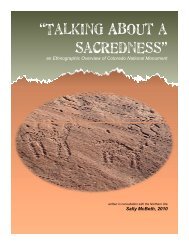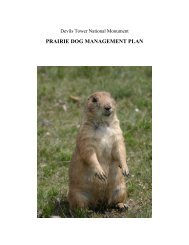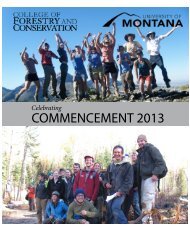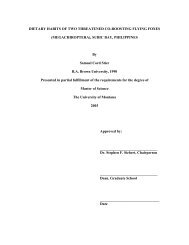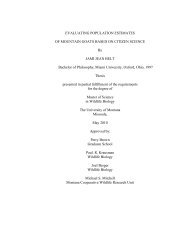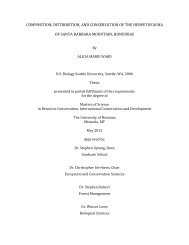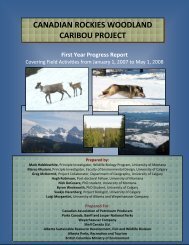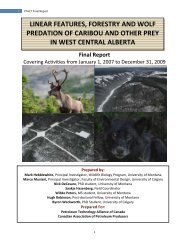Wintersession in Vietnam - University of Montana
Wintersession in Vietnam - University of Montana
Wintersession in Vietnam - University of Montana
Create successful ePaper yourself
Turn your PDF publications into a flip-book with our unique Google optimized e-Paper software.
DRAFT SYLLABUS<br />
Deep <strong>in</strong> the Delta: <strong>W<strong>in</strong>tersession</strong> <strong>in</strong> <strong>Vietnam</strong><br />
The <strong>University</strong> <strong>of</strong> <strong>Montana</strong><br />
December 26, 2011 to January 19, 2012<br />
Course Title and List<strong>in</strong>gs (6 semester credits comb<strong>in</strong>ed)<br />
NRSM 391: Society, Economy and Environment <strong>of</strong> the Mekong Delta (3 credits)<br />
This course is cross-listed as:<br />
ENST 391: Society, Economy and Environment <strong>of</strong> the Mekong Delta<br />
ANTY 391: Society, Economy and Environment <strong>of</strong> the Mekong Delta<br />
GPHY 391: Society, Economy and Environment <strong>of</strong> the Mekong Delta<br />
NRSM 395: Climate Change Effects and Adaptation <strong>in</strong> the Mekong Delta (3 credits)<br />
This course is cross-listed as:<br />
ENST 391: Climate Change Effects and Adaptation <strong>in</strong> the Mekong Delta<br />
ANTY 391: Climate Change Effects and Adaptation <strong>in</strong> the Mekong Delta<br />
GPHY 391: Climate Change Effects and Adaptation <strong>in</strong> the Mekong Delta<br />
Instructors<br />
Ms. Nicky Phear, Instructor and Program Coord<strong>in</strong>ator, Climate Change Studies Program<br />
Several pr<strong>of</strong>essors from Can Tho <strong>University</strong> will also provide major contributions to the<br />
program, as <strong>in</strong>dicated <strong>in</strong> the attached it<strong>in</strong>erary.<br />
Course Description and Learn<strong>in</strong>g Objectives<br />
This course <strong>in</strong>tegrates two, three-credit courses: Society, Economy and Environment <strong>in</strong> the<br />
Mekong Delta and Climate Change Effects and Adaptation <strong>in</strong> the Mekong Delta. Together, these<br />
courses make the six credit <strong>Vietnam</strong> study abroad program. The goal <strong>of</strong> the program is to use the<br />
Mekong Delta case to explore the potential social, economic and environmental impacts <strong>of</strong><br />
climate change <strong>in</strong> a tropical, develop<strong>in</strong>g country context. Adaptation strategies and mitigation<br />
opportunities will be emphasized, and comparisons will be made with the North American<br />
context.<br />
<strong>Vietnam</strong> is an amaz<strong>in</strong>g country with welcom<strong>in</strong>g people, a fasc<strong>in</strong>at<strong>in</strong>g history and culture, warm<br />
tropical climate, and diverse, but threatened, ecosystems and their associated flora and fauna.<br />
The program will be based out <strong>of</strong> the city <strong>of</strong> Can Tho <strong>in</strong> the Mekong Delta, but <strong>in</strong>clude time <strong>in</strong><br />
Ho Chi M<strong>in</strong>h City and two weeks <strong>in</strong> the field visit<strong>in</strong>g small and large scale agriculture and<br />
aquaculture farm<strong>in</strong>g communities, wetlands, forests, Can Tho <strong>University</strong> agricultural and<br />
mangrove management field experiment stations, and cultural sites (e.g. temples and a traditional<br />
village). Field activities will <strong>in</strong>clude <strong>in</strong>vestigative learn<strong>in</strong>g through convers<strong>in</strong>g with local people<br />
and perform<strong>in</strong>g field research <strong>in</strong> Tram Chim National Park and mangrove forests <strong>in</strong> Ca Mau<br />
Prov<strong>in</strong>ce. The program also <strong>in</strong>cludes a home stay with families <strong>in</strong> Can Tho.<br />
NRSM 391 Society, Economy and Environment <strong>of</strong> the Mekong Delta focuses on the history,<br />
culture, economy and environment <strong>of</strong> <strong>Vietnam</strong>, with particular emphasis on the Mekong Delta<br />
region. This is achieved through lectures from local pr<strong>of</strong>essors at Can Tho <strong>University</strong>, active<br />
participation <strong>in</strong> field trips, field data collection, analysis and <strong>in</strong>terpretation, the home stay, course<br />
1
ead<strong>in</strong>gs, and synthesis provided by <strong>University</strong> <strong>of</strong> <strong>Montana</strong> pr<strong>of</strong>essors. The goal <strong>of</strong> this half <strong>of</strong><br />
the <strong>Vietnam</strong> study abroad program is to provide an understand<strong>in</strong>g <strong>of</strong> the unique environments<br />
and the socio-economy <strong>of</strong> the Mekong Delta region to facilitate learn<strong>in</strong>g about the effects <strong>of</strong><br />
climate change on these complex natural and anthropogenic systems. The specific course<br />
objectives <strong>in</strong>clude:<br />
• Understand<strong>in</strong>g the historical climate and distribution and ecological diversity <strong>of</strong> natural<br />
ecosystems <strong>in</strong> the Mekong Delta;<br />
• Develop<strong>in</strong>g an understand<strong>in</strong>g <strong>of</strong> the ecology and ecosystem services provided by large<br />
floodpla<strong>in</strong> rivers, like the Mekong River, and mangrove ecosystems <strong>in</strong> the Mekong Delta;<br />
• Develop<strong>in</strong>g an understand<strong>in</strong>g <strong>of</strong> the historical and contemporary political and socioeconomic<br />
contexts <strong>in</strong> which the Mekong River and Delta <strong>in</strong> <strong>Vietnam</strong> have been managed.<br />
• Understand<strong>in</strong>g the current land uses, <strong>in</strong>clud<strong>in</strong>g land management practices <strong>in</strong> the Mekong<br />
Delta;<br />
• Understand<strong>in</strong>g the condition and causes <strong>of</strong> the current state <strong>of</strong> health <strong>of</strong> natural<br />
ecosystems <strong>in</strong> the Mekong Delta;<br />
• Develop<strong>in</strong>g an appreciation <strong>of</strong> the socio-economic condition and common livelihood<br />
activities <strong>of</strong> people liv<strong>in</strong>g <strong>in</strong> the Delta, <strong>in</strong>clud<strong>in</strong>g agriculture and aquaculture development<br />
and management practices;<br />
• Understand<strong>in</strong>g the grow<strong>in</strong>g importance <strong>of</strong> tourism for local livelihoods and the economy<br />
<strong>of</strong> the Mekong Delta;<br />
• Develop<strong>in</strong>g an understand<strong>in</strong>g <strong>of</strong> the perceptions and attitudes that local people have about<br />
their environment, <strong>in</strong>clud<strong>in</strong>g climate change impacts, and possible adaptation strategies;<br />
• Understand<strong>in</strong>g the historical and contemporary anthropogenic impacts on the Mekong<br />
Delta and how the Mekong River and the Delta’s ecosystems affect peoples’ lives; and,<br />
• Recogniz<strong>in</strong>g complexities <strong>in</strong> Mekong Delta management due to the river catchment<br />
spann<strong>in</strong>g Laos, Cambodia, Thailand and Ch<strong>in</strong>a.<br />
NRSM 391 Climate Change Effects and Adaptation <strong>in</strong> the Mekong Delta focuses on the<br />
threats posed by climate change <strong>in</strong> <strong>Vietnam</strong>, with particular emphasis on the Mekong Delta<br />
region. This is achieved through lectures from Can Tho <strong>University</strong> pr<strong>of</strong>essors, active<br />
participation <strong>in</strong> field trips, field data collection, analysis and <strong>in</strong>terpretation, the homestay, course<br />
read<strong>in</strong>gs, and synthesis provided by <strong>University</strong> <strong>of</strong> <strong>Montana</strong> pr<strong>of</strong>essors. The goal <strong>of</strong> this half <strong>of</strong><br />
the <strong>Vietnam</strong> study abroad program is to provide an understand<strong>in</strong>g <strong>of</strong> the potential impacts <strong>of</strong><br />
climate change on the ecosystems and people <strong>of</strong> the Mekong Delta, and explore opportunities for<br />
people to adapt to and mitigate these impacts. The specific course objectives <strong>in</strong>clude:<br />
• Becom<strong>in</strong>g familiar with future climate scenarios for <strong>Vietnam</strong>, particularly the Mekong<br />
Delta region;<br />
• Understand<strong>in</strong>g the scale and severity <strong>of</strong> potential ecological and socio-economic impacts<br />
<strong>of</strong> climate change <strong>in</strong> the Mekong Delta;<br />
• Understand<strong>in</strong>g the <strong>Vietnam</strong>ese government position on climate change. What climate<br />
change-related policies are <strong>in</strong> place and how is the government address<strong>in</strong>g the problem?;<br />
2
• Understand<strong>in</strong>g the level <strong>of</strong> knowledge, <strong>in</strong>terest and concern that the people <strong>of</strong> <strong>Vietnam</strong><br />
have about climate change and their ideas about potential mitigation and adaptation<br />
strategies;<br />
• Develop<strong>in</strong>g an understand<strong>in</strong>g <strong>of</strong> the technical feasibility and economic efficiency <strong>of</strong><br />
potential adaptation and mitigation strategies to protect ecological health, livelihoods and<br />
<strong>in</strong>frastructure <strong>in</strong> <strong>Vietnam</strong>; and,<br />
• Develop<strong>in</strong>g an appreciation <strong>of</strong> the similarities and differences <strong>in</strong> climate change impacts,<br />
government policies, and potential adaptation and mitigation opportunities between<br />
<strong>Vietnam</strong> and North America.<br />
Prerequisites<br />
There are no prerequisites, but eligible students must be accepted by the <strong>University</strong> <strong>of</strong> <strong>Montana</strong><br />
and be <strong>in</strong> good academic stand<strong>in</strong>g at their home <strong>in</strong>stitution.<br />
Compulsory pre-departure meet<strong>in</strong>gs<br />
Students are required to attend two compulsory two-hour pre-trip meet<strong>in</strong>gs, one <strong>in</strong> November<br />
and another <strong>in</strong> December before the end <strong>of</strong> f<strong>in</strong>als week, for an <strong>in</strong>troduction to the program and to<br />
discuss preparations for the trip.<br />
Required and Recommended Read<strong>in</strong>gs<br />
Required pre-departure course read<strong>in</strong>gs (to be revised by December 9, 2011)<br />
1. <strong>Vietnam</strong> Study Abroad Booklet.<br />
2. State Department Background Notes on <strong>Vietnam</strong>.<br />
3. Lonely Planet <strong>Vietnam</strong> Travel Guide (not the Hanoi and Halong Bay travel guide). Provides<br />
an <strong>in</strong>troduction to the history and culture <strong>of</strong> the country, along with travel tips.<br />
4. Waibel, M. (2008). Implications and challenges <strong>of</strong> climate change for <strong>Vietnam</strong>. Pacific<br />
News. Nr. 29, January/February. 2 pages.<br />
5. The Copenhagen Diagnosis. (2009). Updat<strong>in</strong>g the World on the Latest Climate Science. I.<br />
Allison, N.L. B<strong>in</strong>d<strong>of</strong>f, R.A. B<strong>in</strong>dschadler, P.M. Cox, N. de Noblet, M.H. England, J.E.<br />
Francis, N. Gruber, A.M. Haywood, D.J. Karoly, G. Kaser, C. Le Quéré, T.M. Lenton, M.E.<br />
Mann, B.I. McNeil, A.J. Pitman, S. Rahmstorf, E. Rignot, H.J. Schellnhuber, S.H. Schneider,<br />
S.C. Sherwood, R.C.J. Somerville, K. Steffen, E.J. Steig, M. Visbeck, A.J. Weaver. The<br />
<strong>University</strong> <strong>of</strong> New South Wales. 64 pages.<br />
6. Climate Change Research Centre (CCRC), Sydney, Australia, 60pp. Perlman, D.L. &Morris,<br />
J.R. (2007). What the IPCC said: A citizens’ guide to the IPCC summary for policy makers.<br />
Wash<strong>in</strong>gton, D.C.: Island Press. Includes the Summary for Policy Makers. 56 pages.<br />
7. Parry, M.L., Canziani, O.F., Palutik<strong>of</strong>, J.P., van der L<strong>in</strong>den, P.J and Hansen, C.E. (eds)<br />
(2007), Contribution <strong>of</strong> Work<strong>in</strong>g Group II to the Fourth Assessment Report <strong>of</strong> the<br />
Intergovernmental Panel on Climate Change 2007, Cambridge <strong>University</strong> Press, Cambridge.<br />
Read a) Chapter 6: Coastal Systems and Low Ly<strong>in</strong>g Areas (pp. 317-345) and b) Chapter 10:<br />
Asia (pp. 471-497).<br />
3
8. White, I. (2002). Water management <strong>in</strong> the Mekong: Changes, conflicts & opportunities.<br />
International Hydrological Programme. UNESCO, Paris. pp. 5-24.<br />
9. Mong, A. (2007). A farmer’s son tried to save the Mekong Delta. World Blog. Retrieved<br />
from: http://worldblog.msnbc.msn.com/_news/2007/09/24/4376400-a-farmers-son-tries-tosave-the-mekong-delta.<br />
10. Speech by H.E. Mr. Cao Duc Phat, M<strong>in</strong>ister <strong>of</strong> Agriculture and Rural Development, Head <strong>of</strong><br />
Viet Nam’s Delegation at the Jo<strong>in</strong>t High-Level Segment <strong>of</strong> the United Nations Climate<br />
Change, 10 December 2010. 2 pages.<br />
Recommended course read<strong>in</strong>gs (download onto your computer to take with you)<br />
11. Adger, W.N. (1999), ‘Social vulnerability to climate change and extremes <strong>in</strong> coastal<br />
<strong>Vietnam</strong>’, World Development, 27(2): 249-269.<br />
12. Dasgupta, S., Laplante, B., Meisner, C., Wheeler, D. and Yan, J. (2009), The impact <strong>of</strong> sea<br />
level rise on develop<strong>in</strong>g countries: a comparative analysis, Climatic Change, 93(3-4): 379-<br />
388. Especially the section on East Asia, where <strong>Vietnam</strong> gets special treatment.<br />
13. Do, T.N. and Bennett, J. (2009), ‘Estimat<strong>in</strong>g wetland biodiversity values: a choice model<strong>in</strong>g<br />
application <strong>in</strong> <strong>Vietnam</strong>’s Mekong River Delta’, Environment and Development Economics,<br />
14(2): 163-186.<br />
14. Erw<strong>in</strong>, K.L. (2009), ‘Wetlands and global climate change: the role <strong>of</strong> wetland restoration <strong>in</strong> a<br />
chang<strong>in</strong>g world’, Wetlands Ecology and Management, 17(1): 71-84. The Mekong Delta<br />
features <strong>in</strong> this paper.<br />
15. Hirsch, P. (2006), ‘Water governance reform and catchment management <strong>in</strong> the Mekong<br />
region’, Journal <strong>of</strong> Environment and Development, 15(2): 184-201. Transboundary<br />
governance <strong>of</strong> the Mekong River.<br />
16. Kelly, P.M. and Adger, W.N. (2000), ‘Theory and practice <strong>in</strong> assess<strong>in</strong>g vulnerability to<br />
climate change and facilitat<strong>in</strong>g adaptation’, Climatic Change, 47(4): 325-352. An application<br />
to coastal <strong>Vietnam</strong>.<br />
17. Economist. (2010). Adapt<strong>in</strong>g to climate change: Fac<strong>in</strong>g the consequences. Nov. 25. Pr<strong>in</strong>t<br />
Edition.<br />
18. M<strong>in</strong>istry <strong>of</strong> Natural Resources and Environment. (2008). National target program to respond<br />
to climate change. 111 pages.<br />
19. M<strong>in</strong>istry <strong>of</strong> Natural Resources and Environment. (2003). Viet Nam Initial National<br />
Communication: Under the United Nations framework Convention on Climate Change. 135<br />
pages.<br />
4
Read<strong>in</strong>gs: Course read<strong>in</strong>gs can be accessed via the l<strong>in</strong>ks provided above and will be available<br />
electronically through the <strong>University</strong> <strong>of</strong> <strong>Montana</strong> Library by December 9, 2011. To access the<br />
read<strong>in</strong>gs, go to the follow<strong>in</strong>g website: http://eres.lib.umt.edu/course<strong>in</strong>dex.asp. Search via the<br />
<strong>in</strong>structor “Phear”, click on the course “<strong>Vietnam</strong> <strong>W<strong>in</strong>tersession</strong>” and use the password<br />
“<strong>Vietnam</strong>.” Please download these read<strong>in</strong>gs onto your computer and pr<strong>in</strong>t any for which you<br />
would like hardcopies. Please contact Nicky with any questions or difficulties download<strong>in</strong>g or<br />
pr<strong>in</strong>t<strong>in</strong>g the read<strong>in</strong>gs. Make sure you do the required pre-departure read<strong>in</strong>gs before arriv<strong>in</strong>g <strong>in</strong><br />
Ho Chi M<strong>in</strong>h City. The first question set, will draw from these read<strong>in</strong>gs and is due December 31.<br />
Compulsory post-trip activities<br />
Students and the <strong>University</strong> <strong>of</strong> <strong>Montana</strong> <strong>in</strong>structors will meet early <strong>in</strong> Spr<strong>in</strong>g semester for a twohour<br />
de-brief and f<strong>in</strong>al synthesis <strong>of</strong> the program.<br />
Computers<br />
While we are <strong>in</strong> Can Tho and Ho Chi M<strong>in</strong>h City we will have access to hotel wireless <strong>in</strong>ternet<br />
connection, <strong>in</strong>ternet cafes, and sometimes hotel bus<strong>in</strong>ess room facilities. This level <strong>of</strong> access may<br />
be sufficient for keep<strong>in</strong>g <strong>in</strong> touch with friends and family via email. However, it is unlikely to be<br />
sufficient for complet<strong>in</strong>g question sets and the term paper. Neat, hand written assessment items<br />
will be perfectly acceptable dur<strong>in</strong>g the program. Nevertheless, you are strongly encouraged to<br />
br<strong>in</strong>g along a laptop computer if you do have access to one. Please always keep your laptop with<br />
you <strong>in</strong> your carry-on luggage while travell<strong>in</strong>g, and be sure to br<strong>in</strong>g a power adapter.<br />
Assessment<br />
The follow<strong>in</strong>g table outl<strong>in</strong>es the assessment for the program. There are seven assessment items<br />
(<strong>in</strong>clud<strong>in</strong>g four question sets). Because <strong>of</strong> the complementary nature <strong>of</strong> the two courses that<br />
together make up the <strong>Vietnam</strong> study abroad program, these assessment items do cover both<br />
NRSM 391 Society, Economy and Environment <strong>of</strong> the Mekong Delta and NRSM 391 Climate<br />
Change Effects and Adaptation <strong>in</strong> the Mekong Delta. Instructor will assign separate grades for<br />
both classes for each assessment item.<br />
Item Date % course<br />
grade<br />
Question sets<br />
1) History, economy, and culture <strong>of</strong> <strong>Vietnam</strong><br />
2) Impact <strong>of</strong> climate change on <strong>Vietnam</strong>’s coastal and lowly<strong>in</strong>g<br />
areas<br />
3) Livelihoods and Climate Change. Choose one <strong>of</strong> the<br />
follow<strong>in</strong>g three topics:<br />
a. Agriculture and aquaculture livelihoods<br />
b. Tourism <strong>in</strong> <strong>Vietnam</strong><br />
c. Mangrove ecology and fish<strong>in</strong>g communities<br />
4) Respond<strong>in</strong>g to climate change<br />
Blog post (one required; question set #4 can be substituted for a<br />
second blog post, with <strong>in</strong>structor permission)<br />
Field journal <strong>in</strong>clud<strong>in</strong>g one-m<strong>in</strong>ute responses for each speaker<br />
Participation<br />
5<br />
31 December<br />
7 January<br />
13 January<br />
23 January<br />
19 January<br />
23 January<br />
15<br />
15<br />
15<br />
15<br />
15<br />
20<br />
5
Question sets<br />
Each question set will require students to answer a series <strong>of</strong> questions draw<strong>in</strong>g from lecture<br />
notes, read<strong>in</strong>gs, and field experiences. There is a 500-700 word limit for each question set.<br />
References <strong>in</strong>clud<strong>in</strong>g personal communications (e.g. from pr<strong>of</strong>essors and local people) and<br />
<strong>in</strong>formation available from field trips are encouraged. These should be cited with<strong>in</strong> the paper <strong>in</strong><br />
the author-date style and listed <strong>in</strong> a references section at the end <strong>of</strong> the essay. References are <strong>in</strong><br />
addition to the 500-700 word limit. Papers can be hand-written or emailed to the <strong>in</strong>structor by the<br />
due dates listed below.<br />
December 31:<br />
1) History, economy, and culture <strong>of</strong> <strong>Vietnam</strong>. Discuss important historic <strong>in</strong>fluences, current<br />
domestic and <strong>in</strong>ternational issues concern<strong>in</strong>g <strong>Vietnam</strong>, political and economic structure, and<br />
important cultural customs and practices.<br />
January 7:<br />
2) Climate change impacts on <strong>Vietnam</strong>’s coastal and low-ly<strong>in</strong>g areas. Detail current<br />
sensitivity and vulnerability, future trends <strong>in</strong> terms <strong>of</strong> impacts and vulnerabilities, and adaptation<br />
and mitigation options.<br />
January 13:<br />
3) Livelihoods and climate change. Choose one <strong>of</strong> the follow<strong>in</strong>g three topics:<br />
a. Agriculture and aquaculture livelihoods. Choose one agriculture or aquaculture<br />
livelihood <strong>in</strong> the Mekong Delta: describe the land use practice and the predom<strong>in</strong>ant<br />
environmental and economic susta<strong>in</strong>ability issues; discuss also the potential impact <strong>of</strong><br />
climate change and one potential adaptation strategy.<br />
b. Tourism <strong>in</strong> <strong>Vietnam</strong>. Discuss the importance <strong>of</strong> tourism for local livelihoods and the<br />
economy <strong>of</strong> the Mekong Delta; describe at least one important tourism site and the<br />
potential climate change impact on this site.<br />
c. Mangrove ecology and fish<strong>in</strong>g communities. Describe the ecology and ecosystem<br />
services <strong>of</strong> the mangroves ecosystems, discuss current conditions result<strong>in</strong>g from<br />
anthropogenic change to the Delta, compare farm<strong>in</strong>g systems that do and do not <strong>in</strong>tegrate<br />
mangrove management, and expla<strong>in</strong> one implications <strong>of</strong> climate change.<br />
January 23:<br />
6) Respond<strong>in</strong>g to climate change. Draw<strong>in</strong>g on course learn<strong>in</strong>g: What are the key impacts and<br />
vulnerabilities fac<strong>in</strong>g <strong>Vietnam</strong>? What is your sense for local understand<strong>in</strong>g and perception <strong>of</strong><br />
climate change impacts? What options does the country have for mitigat<strong>in</strong>g and adapt<strong>in</strong>g to<br />
climate change? What role and responsibility does the USA have and the world at large?<br />
Blog post<br />
Students will write one, 500-600 word weblog entry on a particular topic <strong>of</strong> <strong>in</strong>terest that you<br />
expect will emerge from our experiences and course learn<strong>in</strong>g. By December 14, you will need to<br />
send Nicky a list <strong>of</strong> three possible topics you may want to cover. With advanced approval, you<br />
are allowed to substitute the 4 th question set for a second blog post. These blog posts will be<br />
6
edited and posted on the Climate Change Studies website. More detailed <strong>in</strong>structions and<br />
guidel<strong>in</strong>es for blog writ<strong>in</strong>g will be provided separately.<br />
Field Journal and One-M<strong>in</strong>ute Responses<br />
Students are expected to keep a personal journal chronicl<strong>in</strong>g <strong>in</strong>sights and learn<strong>in</strong>g and specific<br />
notes from guest speakers. Students are not expected to submit their journals. You will need to<br />
submit ‘one m<strong>in</strong>ute responses’ follow<strong>in</strong>g each presentation express<strong>in</strong>g 1) what was new and<br />
<strong>in</strong>terest<strong>in</strong>g to you about the presentation, 2) what (if any) was the speaker’s perspective <strong>in</strong><br />
climate change, and 3) what questions do you still have.<br />
Participation<br />
Active participation <strong>in</strong> all scheduled program–related activities is required, <strong>in</strong>clud<strong>in</strong>g group<br />
meet<strong>in</strong>gs, discussions, field excursions, as well as lectures and any other scheduled activities.<br />
Your participation grade will be based on both your academic and experiential participation. We<br />
expect active engagement <strong>in</strong> class discussions, with course speakers and academic activities. We<br />
also expect you to participate <strong>in</strong> the necessary practical aspects <strong>of</strong> the course, <strong>in</strong>clud<strong>in</strong>g respect<br />
for local customs and culture, safety consciousness, follow<strong>in</strong>g directions, and timel<strong>in</strong>ess.<br />
Attendance and lateness policy<br />
Dur<strong>in</strong>g the field studies, no student is to leave the group without the consent <strong>of</strong> a <strong>University</strong> <strong>of</strong><br />
<strong>Montana</strong> <strong>in</strong>structor, and punctual attendance at all field and on-campus meet<strong>in</strong>gs is required.<br />
Unless an absence is approved by one <strong>of</strong> the <strong>in</strong>structors, students will lose 10% <strong>of</strong> their f<strong>in</strong>al<br />
grade for each day or part-day they fail to participate. Any unexcused absences or cont<strong>in</strong>ued late<br />
arrival to program activities may, at the discretion <strong>of</strong> <strong>University</strong> <strong>of</strong> <strong>Montana</strong> <strong>in</strong>structors, be<br />
grounds for dismissal from the program.<br />
Permission must be obta<strong>in</strong>ed <strong>in</strong> advance to turn <strong>in</strong> any assignment late. A standard policy <strong>of</strong><br />
subtract<strong>in</strong>g 10% per day late (or part <strong>of</strong> day late) is fair to everyone (students, <strong>in</strong>structors, and<br />
adm<strong>in</strong>istration).<br />
Some th<strong>in</strong>gs to consider when prepar<strong>in</strong>g for the trip<br />
Climate<br />
This trip is tak<strong>in</strong>g place dur<strong>in</strong>g <strong>Vietnam</strong>ese dry season (some locals refer to this period as<br />
w<strong>in</strong>ter); the most comfortable time <strong>of</strong> year for outdoor activities <strong>in</strong> the Mekong Delta. The<br />
average daily m<strong>in</strong>imum and maximum temperatures <strong>in</strong> Can Tho <strong>in</strong> January are 22ºC (72ºF) and<br />
28ºC (82ºF), respectively. The average daily humidity <strong>in</strong> January is 71% and average monthly<br />
precipitation is about two <strong>in</strong>ches (compared to 89% and 19 <strong>in</strong>ches <strong>in</strong> August!). Nevertheless,<br />
accept that you are probably go<strong>in</strong>g to be hot and sticky whenever you are mov<strong>in</strong>g around<br />
outside. Dr<strong>in</strong>k plenty <strong>of</strong> water. These conditions also make it important to bathe regularly and<br />
not to let dirty clothes accumulate <strong>in</strong> piles. Keep ahead <strong>of</strong> your laundry pile by wash<strong>in</strong>g clothes<br />
regularly and hang dirty clothes to air out if you are not wash<strong>in</strong>g them right away.<br />
Medication and immunization<br />
Visit your doctor or the County Health Cl<strong>in</strong>ic to f<strong>in</strong>d out what vacc<strong>in</strong>ations you may require<br />
before travell<strong>in</strong>g to <strong>Vietnam</strong>, and medication to prevent contract<strong>in</strong>g malaria (such as Malarone)<br />
and for treat<strong>in</strong>g an upset stomach (such as Cipr<strong>of</strong>loxac<strong>in</strong>). You should seriously consider be<strong>in</strong>g<br />
7
immunized aga<strong>in</strong>st typhoid, hepatitis A, hepatitis B, men<strong>in</strong>gitis, Japanese encephalitis, tetanus<br />
and polio.<br />
Dress code<br />
In general, <strong>Vietnam</strong> has a conservative dress code. Dress code laws do not appear to be strictly<br />
enforced <strong>in</strong> <strong>Vietnam</strong>, but regulations govern<strong>in</strong>g <strong>Vietnam</strong>’s historic sites and tourist attractions<br />
state that “Entry is forbidden to tourists wear<strong>in</strong>g sleeveless shirts or shorts”. At universities and<br />
cultural sites and other tourist attractions, plan to wear long pants or long skirts or dresses. Long<br />
or short-sleeve shirts are acceptable. Shorts and sleeveless shirts are not acceptable. Dirty clothes<br />
are not acceptable.<br />
When gett<strong>in</strong>g around Ho Chi M<strong>in</strong>h City and Can Tho <strong>in</strong> your free time, shorts will generally be<br />
acceptable, but consider where you plan to go and dress appropriately. Cloth<strong>in</strong>g that exposes the<br />
belly button and shoulders are not appropriate anywhere.<br />
For our field trips, long pants are recommended for men and women, but shorts will be<br />
acceptable <strong>in</strong> many cases (check with the Can Tho <strong>University</strong> pr<strong>of</strong>essors lead<strong>in</strong>g field trips).<br />
Long or short sleeved shirts will be acceptable. Your clothes will get dirty <strong>in</strong> the field and this<br />
will be acceptable <strong>in</strong> rural areas<br />
Homestay<br />
In Can Tho, all students will enjoy a homestay experience for a few days with a local family.<br />
Although we will be busy with other learn<strong>in</strong>g activities dur<strong>in</strong>g your home stay, this experience<br />
will help you to appreciate life and culture <strong>in</strong> <strong>Vietnam</strong>, and hopefully discover some th<strong>in</strong>gs about<br />
yourself. You will f<strong>in</strong>d your hosts to be friendly and open with you, but remember that to make<br />
the most <strong>of</strong> your experience you will need to reciprocate and spend time with your family. You<br />
will be expected to behave as a self-support<strong>in</strong>g adult member <strong>of</strong> the household. Be aware <strong>of</strong> and<br />
sensitive to how your presence can contribute positively and negatively to the family. More<br />
<strong>in</strong>formation about the homestay will be provided at a pre-departure meet<strong>in</strong>g and <strong>in</strong> <strong>Vietnam</strong>.<br />
In the field<br />
Make sure you have with you each day:<br />
• sturdy, closed shoes;<br />
• at least two liters <strong>of</strong> water (Avoid dr<strong>in</strong>k<strong>in</strong>g tap water. We will be buy<strong>in</strong>g bottled water);<br />
• field notebook, pencils/pens and a map <strong>of</strong> the Mekong Delta to get you oriented (we will<br />
obta<strong>in</strong> from a bookstore <strong>in</strong> Can Tho);<br />
• hat, sunglasses and sunscreen;<br />
• <strong>in</strong>sect repellant (consider wear<strong>in</strong>g long sleeve shirts and long pants if you are particularly<br />
concerned about <strong>in</strong>sect bites);<br />
• ra<strong>in</strong>coat and a dry shirt;<br />
• snacks to eat <strong>in</strong> between meals provided if you th<strong>in</strong>k you will need them;<br />
• any medication or medical supplies you might require; and<br />
• b<strong>in</strong>oculars and camera.<br />
8
Academic honesty<br />
All academic work must meet standards <strong>of</strong> academic honesty (as described <strong>in</strong> the Student<br />
Handbook). Each student is responsible for <strong>in</strong>form<strong>in</strong>g themselves about those standards before<br />
perform<strong>in</strong>g any academic work. Academic dishonesty is not just copy<strong>in</strong>g the work <strong>of</strong> others, but<br />
also <strong>in</strong>cludes such behaviors as tolerat<strong>in</strong>g the academic dishonesty <strong>of</strong> others or giv<strong>in</strong>g false<br />
reasons for failure to take a test.<br />
Your signature on any exam or name pr<strong>in</strong>ted on any assignment <strong>in</strong>dicates your acceptance <strong>of</strong> the<br />
follow<strong>in</strong>g policy: “I have neither given nor received unauthorized aid on this exam or<br />
assignment.” Please give due credit to other people’s ideas by referenc<strong>in</strong>g or quot<strong>in</strong>g the source.<br />
Special accommodations<br />
Any student with a disability who needs an accommodation or other assistance <strong>in</strong> this course<br />
must contact the <strong>in</strong>structor and AUIP at least four weeks before the program beg<strong>in</strong>s. After that<br />
time, we cannot guarantee that such needs can be accommodated. Some activities <strong>in</strong>volve<br />
moderate exercise, such as hik<strong>in</strong>g and swimm<strong>in</strong>g and participation is voluntary for all students.<br />
Conduct regulations<br />
All students must be familiar with the general conduct regulations described <strong>in</strong> the Student<br />
Handbook. Below are other program-specific conduct regulations to which students must adhere.<br />
Failure to obey these policies may result <strong>in</strong> dismissal from the program, at the discretion <strong>of</strong> the<br />
Program Director.<br />
Student Conduct <strong>in</strong> Accommodation: Our program depends on goodwill between us and<br />
accommodation owners and managers, <strong>in</strong>clud<strong>in</strong>g homestay families. If we have any issues with<br />
unpleasant or noisy conduct <strong>in</strong> the accommodations, it creates problems when we attempt to<br />
book for the students <strong>in</strong> the NEXT program. Thus, for the sake <strong>of</strong> the students that follow you,<br />
improper conduct <strong>in</strong> the accommodations that disturb other guests or the staff or cause damage<br />
are not acceptable and can be grounds for dismissal from the program.<br />
Conduct <strong>in</strong> the Field: Students must follow the <strong>in</strong>structions <strong>of</strong> staff exactly and promptly when<br />
<strong>in</strong> the field. This is a serious safety issue when we are do<strong>in</strong>g outdoor activities <strong>in</strong> particular.<br />
Failure to follow <strong>in</strong>structions that <strong>in</strong>cur actual or likely physical harm to self or others, or result<br />
<strong>in</strong> time wasted by the staff or other students may, at the discretion <strong>of</strong> the Program Director, be<br />
grounds for dismissal from the program.<br />
It<strong>in</strong>erary—See Next Page<br />
9
Tentative It<strong>in</strong>erary for <strong>University</strong> <strong>of</strong> <strong>Montana</strong> <strong>Vietnam</strong> Study Abroad Program<br />
27 December 2011 to 19 January 2012<br />
Note that these are the days <strong>in</strong> <strong>Vietnam</strong>. We will be meet<strong>in</strong>g twice prior <strong>in</strong> the fall semester for<br />
two hours each and you will have pre-departure work to complete. You will need to depart the<br />
USA no later than 26 December to arrive <strong>in</strong> <strong>Vietnam</strong> by 27 December. Because we ga<strong>in</strong> a day<br />
return<strong>in</strong>g to the USA, we will depart <strong>Vietnam</strong> and return to Missoula on 19 January. There will<br />
be one two-hour post-tour meet<strong>in</strong>g early <strong>in</strong> spr<strong>in</strong>g semester.<br />
Tuesday 27 December Day 1: Ho Chi M<strong>in</strong>h City<br />
10 pm – 11pm<br />
Accommodation<br />
Flights arrive, meet at airport. Check <strong>in</strong>to hotel.<br />
Victory Hotel<br />
Wednesday 28 December Day 2: Ho Chi M<strong>in</strong>h City<br />
9:00 am<br />
10:30 am to 11:00 am<br />
11:00 pm to 12:00 pm<br />
12:30-3:00 pm<br />
3:00-5:00 pm<br />
6:00 pm to 7:30 pm:<br />
Accommodation<br />
Breakfast at hotel<br />
Group walk to change money<br />
Lunch<br />
Introduction to <strong>Vietnam</strong> and Ho Chi M<strong>in</strong>h City. Geographical<br />
overview, history (<strong>in</strong>clud<strong>in</strong>g French and American <strong>in</strong>fluence)<br />
and <strong>Vietnam</strong> today (<strong>in</strong>clud<strong>in</strong>g its place <strong>in</strong> the world, and<br />
<strong>in</strong>ternational relations), important domestic and <strong>in</strong>ternational<br />
issues and concerns <strong>Vietnam</strong> is confront<strong>in</strong>g today, overview<br />
<strong>of</strong> government system and structure, overview <strong>of</strong> the <strong>Vietnam</strong><br />
economy. Introduction to culture, learn<strong>in</strong>g some basic<br />
<strong>Vietnam</strong>ese phrases and travel tips for Ho Chi M<strong>in</strong>h City.<br />
Walk to US Consulate for meet<strong>in</strong>gs and then return to Hotel<br />
Group d<strong>in</strong>ner<br />
Victory Hotel<br />
Thursday 29 December Day 3: Ho Chi M<strong>in</strong>h City<br />
8:30 am to 9:30 am<br />
9:30 am to 1:00 pm<br />
1:30 pm – 4:30 pm<br />
Group breakfast at hotel<br />
Depart by van to International <strong>University</strong> <strong>of</strong> HCMC to meet<br />
with <strong>University</strong> students, <strong>in</strong>clud<strong>in</strong>g Saigon 350 club. Lunch<br />
at the <strong>University</strong>.<br />
Visit War Remnants Museum and Reunification Palace with<br />
students from International <strong>University</strong>.<br />
10
5:30 pm<br />
Accommodation<br />
Group d<strong>in</strong>ner with <strong>Vietnam</strong>ese students from International<br />
<strong>University</strong> at Quan Ngon, a popular, slightly up-scale<br />
restaurant at 160 Pasteur Street. Only 15 m<strong>in</strong>ute walk from<br />
Victory Hotel.<br />
Victory Hotel<br />
Friday 30 December Day 4: Ho Chi M<strong>in</strong>h City<br />
8:30 am to 9:30 am<br />
9:30 am to 4:00 pm<br />
5:30 pm<br />
Accommodation<br />
Group breakfast at hotel<br />
Field trip to a factory—clothes or food process<strong>in</strong>g. Focus on<br />
current economy, development, and globalization.<br />
Group d<strong>in</strong>ner<br />
Victory Hotel<br />
Saturday 31 December Day 4: Ho Chi M<strong>in</strong>h City<br />
8:30 am to 9:30 am<br />
10:00 am to 12:00 pm<br />
5:30 pm<br />
Accommodation<br />
Breakfast on your own<br />
Group debrief meet<strong>in</strong>g/class. Work on Question Set # 1:<br />
History, economy, and culture <strong>of</strong> <strong>Vietnam</strong>.<br />
QUESTION SET #1 DUE – History, economy, and<br />
culture <strong>of</strong> <strong>Vietnam</strong><br />
Group d<strong>in</strong>ner and enjoy New Year’s Eve festivities <strong>in</strong><br />
downtown Ho Chi M<strong>in</strong>h City as a group<br />
Victory Hotel<br />
Sunday 1 January Day 5: Can Tho<br />
8:00 am<br />
10:00 am<br />
2:00 pm<br />
3:30 pm to 7:00 pm<br />
Accommodation<br />
On your own for breakfast and to walk around downtown.<br />
Depart for Can Tho City (pick up by CTU bus) with lunch on<br />
route<br />
Check- <strong>in</strong> to Guest House Number 2<br />
Orientation and visit to ‘Old Can Tho’ along the Mekong<br />
River <strong>in</strong> the part <strong>of</strong> town where we will be stay<strong>in</strong>g. Visit<br />
market, museum. D<strong>in</strong>ner from outdoor street food vendors by<br />
the Mekong River.<br />
Guest House Number 2, Can Tho<br />
11
Monday 2 January Day 6 Can Tho<br />
9:00 am to 10:30 am<br />
11:00 pm to 4:00 pm<br />
Accommodation<br />
Tuesday 3 January Day 7: Can Tho<br />
9:00 am to 12:00 pm<br />
12:00 pm to 1:00 pm<br />
1:00 pm to 5:00 pm<br />
Accommodation<br />
Dr. Le Khuong N<strong>in</strong>h: The economy <strong>of</strong> the Mekong Delta,<br />
livelihoods <strong>of</strong> local people, economic impacts <strong>of</strong> climate<br />
change on the Mekong Delta<br />
<strong>Vietnam</strong>ese culture lecture and activities – music (am) and<br />
language/religion (pm) with Mr. Le D<strong>in</strong>h Bich<br />
Guest House Number 2, Can Tho<br />
Development <strong>in</strong> the Mekong Delta with Dr Nguyen Huu<br />
Chiem<br />
• Agriculture and aquaculture development, management<br />
practices and environmental and socio-economic impacts<br />
• Other important <strong>in</strong>dustries <strong>in</strong> the Mekong Delta<br />
• Discuss the complex issues surround<strong>in</strong>g susta<strong>in</strong>able<br />
development <strong>in</strong> the Mekong Delta<br />
Lunch at university cafeteria<br />
Exploration<br />
Guest House Number 2, Can Tho<br />
Wednesday 4 January Day 8: Hoa An Experimental Station<br />
7:00 am<br />
8:30 am to 12:00 pm<br />
Travel to Hoa An Experimental Station<br />
Climate change lecture form Director Bio-diversity<br />
Application Research Center, Dr. Duong Van Ni and<br />
overview <strong>of</strong> Hoa An Experimental Station<br />
• Historical and contemporary climate, distribution and<br />
diversity <strong>of</strong> natural ecosystems, human habitation and land<br />
use<br />
• Socio-economic pressures to develop the Mekong Delta<br />
and Government policies related to the Mekong Delta<br />
• Human impacts on the Mekong Delta and how the Delta’s<br />
ecosystems have affected people<br />
• International management <strong>of</strong> the Mekong River<br />
• Key environmental and economic susta<strong>in</strong>ability issues <strong>in</strong><br />
the region<br />
• Future climate and sea level projections for the Mekong<br />
Delta<br />
• Introduce land use and climate change-related<br />
environmental and economic impacts that will be explored<br />
throughout the course<br />
• Discuss what is be<strong>in</strong>g done today <strong>in</strong> the Mekong Delta to<br />
12
12 pm to 1 pm<br />
1 pm to 5 pm<br />
6 pm to 7 pm<br />
Accommodation<br />
mitigate future climate change impacts and highlight other<br />
possibilities.<br />
• Describe how students will explore climate change<br />
impacts <strong>in</strong> <strong>Vietnam</strong> throughout the rest <strong>of</strong> the program<br />
(UM pr<strong>of</strong>essor to lead).<br />
Lunch at Hoa An Experimental Station<br />
Tour experimental farms and facilities, and potentially <strong>of</strong>fsite<br />
po<strong>in</strong>ts <strong>of</strong> <strong>in</strong>terest <strong>in</strong>clud<strong>in</strong>g the local canals and local<br />
community.<br />
D<strong>in</strong>ner at Hoa An Experimental Station<br />
Dormitories at Hoa An Experimental Station<br />
Thursday 5 January Day 9: Hoa An Experimental Station to Can Tho<br />
8:30 am to 10:30 am<br />
10:30 am<br />
4:00 pm<br />
Accommodation<br />
Morn<strong>in</strong>g wrap-up discussion with Dr. Ni, return to Can Tho<br />
Drive back to Can Tho City<br />
Check-<strong>in</strong> at homestay host<br />
Homestay<br />
Friday 6 January Day 10: Can Tho<br />
9:00 am to 12:00 pm<br />
12:00 pm to 1:00 pm<br />
1:00 pm to 5:00 pm<br />
Accommodation<br />
Mangrove ecology and management with Dr. Nguyen Van<br />
Be<br />
Lunch at Can Tho <strong>University</strong><br />
Free time to work on second question set: Impact <strong>of</strong> Climate<br />
Change on <strong>Vietnam</strong>’s coastal and low ly<strong>in</strong>g areas.<br />
Home stay<br />
Saturday 7 January Day 11: Can Tho<br />
4:00 am to 12:00 pm<br />
12:00 pm to 1:00 pm<br />
1:00 pm to 5:00 pm<br />
Can Tho Float<strong>in</strong>g Markets with Mr. Huynh Van Da.<br />
Explore tourist sites <strong>of</strong> <strong>in</strong>terest sites around Can Tho,<br />
<strong>in</strong>clud<strong>in</strong>g islands <strong>in</strong> the Mekong River and discuss economic<br />
significance. Discuss potential climate change impacts on<br />
these sites and tourism-related livelihood activities<br />
Lunch<br />
Afternoon naptime.<br />
13
Accommodation<br />
QUESTION SET #2 DUE – Climate change impacts on<br />
<strong>Vietnam</strong>’s coastal and low-ly<strong>in</strong>g areas<br />
Home stay<br />
Sunday 8 January Day 12: Can Tho<br />
am/pm<br />
Accommodation<br />
Spend the day with homestay family<br />
Home stay<br />
Monday 9 January Day 13: Soc Trang – Fish<strong>in</strong>g Village – Bac Lieu<br />
6:30 am to 9:00 am<br />
12:00 pm to 1:00 pm<br />
1:00 pm to 3:00 pm<br />
3:00 pm to 5:00 pm<br />
Accommodation<br />
Travel to Soc Trang.<br />
Lunch at restaurant <strong>in</strong> Soc Trang<br />
Travel to coastal fish<strong>in</strong>g village with Dr. Nguyen Van Be,<br />
learn about the livelihoods <strong>of</strong> local fishers through<br />
discussions with fish<strong>in</strong>g families. How is climate change<br />
likely to affect the natural environment upon which their<br />
livelihood depends?<br />
D<strong>in</strong>ner with a fish<strong>in</strong>g farmer or <strong>in</strong> Bac Lieu<br />
Hotel <strong>in</strong> Bac Lieu<br />
Tuesday 10 January Day 14: Farms on road from Bac Lieu – Ca Mau<br />
8:00 am to 5:00 pm<br />
Accommodation<br />
With Dr. Nguyen Van Be visit family and commercial<br />
agricultural farms (rice and shrimp) and aquaculture farms.<br />
Visit the large dyke be<strong>in</strong>g built near the highway to protect<br />
farmland from sea water <strong>in</strong>trusion due to climate change.<br />
Hotel <strong>in</strong> Ca Mau<br />
Wednesday 11 January Day 15: Ca Mau – Nam Can<br />
8:00 am to 5:00 pm<br />
Accommodation<br />
With Dr. Nguyen Van Be visit coastal sites where<br />
mangroves have been removed and where healthy stands<br />
rema<strong>in</strong> to demonstrate the importance <strong>of</strong> mangroves for<br />
stabiliz<strong>in</strong>g the coast and for healthy aquatic ecosystems.<br />
Explore the implications <strong>of</strong> climate change on the health <strong>of</strong><br />
mangrove ecosystems and the flow-on implications for<br />
mar<strong>in</strong>e and terrestrial ecosystems. Field research activities <strong>in</strong><br />
mangrove forests.<br />
Can Tho <strong>University</strong> facilities at Nam Can<br />
14
Thursday 12 January Day 16: Nam Can<br />
8:00 am to 4:00 pm<br />
4:00 pm to 9:00 pm<br />
Accommodation<br />
With Dr. Nguyen Van Be explore the implications <strong>of</strong> climate<br />
change on the health <strong>of</strong> mangrove ecosystems and the flowon<br />
implications for mar<strong>in</strong>e and terrestrial ecosystems. What<br />
are the implications <strong>of</strong> unhealthy mangrove ecosystems for<br />
local livelihoods and <strong>Vietnam</strong>ese society more generally?<br />
Return to Can Tho, <strong>in</strong>clud<strong>in</strong>g one hour stop at roadside<br />
restaurant for d<strong>in</strong>ner.<br />
Guest House Number 2, Can Tho<br />
Friday 13 January Day 17: Can Tho<br />
11:00 -12:30 am<br />
11:30 am onward<br />
Accommodation<br />
Group debrief discussion<br />
Explore Can Tho and work on third question set: Livelihoods<br />
and Climate Change.<br />
QUESTION SET #3 DUE – Livelihoods and climate<br />
change<br />
Guest House Number 2, Can Tho<br />
Saturday 14 January Day 18: Can Tho to An Giang Prov<strong>in</strong>ce<br />
7:00 am to 5:00 pm<br />
Accommodation<br />
Visit An Giang Prov<strong>in</strong>ce to explore <strong>in</strong>ternational Mekong<br />
River management issues, forested upland areas, cultural<br />
sights – Ethnic Cambodian village, agriculture and the unique<br />
aquaculture performed <strong>in</strong> this part <strong>of</strong> the country. Hike Mt.<br />
Sam.<br />
Tentative: With families <strong>in</strong> the ethnic Cambodian Village or<br />
hotel<br />
Sunday 15 January Day 19: An Giang Prov<strong>in</strong>ce to Tram Chim National Park<br />
8:30 am to 10:30 am<br />
11:00 am to 12 pm<br />
12:00 pm to 1:00 pm<br />
1:00 pm to 6:00 pm<br />
Accommodation<br />
Drive to Tram Chim National Park<br />
Presentation about the history, ecology and management <strong>of</strong><br />
the Park by park manager<br />
Lunch at National Park <strong>of</strong>fice<br />
Tour and discussion <strong>of</strong> the Park ecosystems, management<br />
units, park boundary issues<br />
Hotel near Tram Chim National Park<br />
15
Monday 16 January Day 20: Tram Chim National Park to Can Tho<br />
10 am to 2:00 pm<br />
Accommodation<br />
Return to Can Tho City<br />
Guest House Number 2, Can Tho<br />
Tuesday 17 January Day 21: Can Tho<br />
am<br />
pm<br />
Accommodation<br />
Free morn<strong>in</strong>g. Time to read and work on blog(s) and onem<strong>in</strong>ute<br />
responses.<br />
Group wrap up discussion: Respond<strong>in</strong>g to climate change.<br />
Guest House Number 2, Can Tho<br />
Wednesday 18 January Day 22: Ho Chi M<strong>in</strong>h City<br />
10:00 am<br />
5:30 pm<br />
Accommodation<br />
Return to Ho Chi M<strong>in</strong>h City, f<strong>in</strong>al shopp<strong>in</strong>g, course<br />
evaluations<br />
F<strong>in</strong>al Group d<strong>in</strong>er<br />
Victory Hotel<br />
Thursday 19 January Day 23: Ho Chi M<strong>in</strong>h City to Missoula<br />
7:00 am onward<br />
Depart <strong>Vietnam</strong> for Missoula<br />
Totals for NRSM 391 Society, Economy and Environment <strong>of</strong> the Mekong Delta and NRSM 391<br />
Climate Change Effects and Adaptation <strong>in</strong> the Mekong Delta<br />
Total classroom contact: 49 hours (equiv. to 3.27 credits)<br />
Total laboratory work: 85 hours (equiv. to 2.83 credits)<br />
Travel time not <strong>in</strong>cluded.<br />
TOTAL 6.0 credits<br />
16



